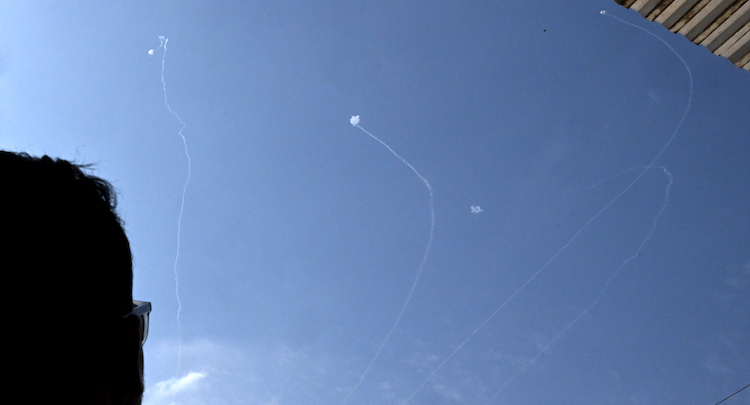A helpful way to understand how much about the Israeli-Palestinian conflict was changed by Oct. 7 is to consider Israelis’ attitudes toward rocket attacks. Rockets must now be treated as far more of a threat than they ever have before.
Rockets, especially those fired from Gaza by Hamas and Palestinian Islamic Jihad, have long been dismissed by Israel’s critics in the West. Those critics don’t have to jolt their children awake in the middle of the night and rush them to a bomb shelter. And it’s true that, so long as you effectively take cover with every single rocket and outfit your home with a bomb shelter, your odds of survival are pretty high. On the other hand, if you believe that Israeli children should live like that, you’re a bit of a ghoul, aren’t you?
Nevertheless, there’s no such thing as “just rockets” anymore.
“I live in Netivot, I’m used to rockets,” Mazal Tazazo says in a documentary I wrote about last week. She was at the Nova music festival and was describing her immediate reaction to rocket fire from Gaza on Oct. 7. “I didn’t stress too much. It’s also crazy to get used to rockets but that’s the reality.”
Another Nova survivor, Yuval Raphael, said her first instinct was to stay at the festival despite hearing a rocket siren, because “this is something that happens here.”
But as the festival goers soon learned, of course, it was not just another rocket attack.
Or take this observation, from Jonathan Foreman’s remarkable cover essay on the failures that led to Israel’s vulnerability on Oct. 7:
“It is now clear that some of Hamas’s rocket barrages in the months and even years before October 7 were part of a program of intelligence-gathering, in accordance with the old Soviet military doctrine of Razvedka Boyem, or ‘reconnaissance through battle.’ The bombardments not only offered a means by which Hamas could assess the capabilities and limitations of the Iron Dome system, they led to the discovery of an enormous Israeli vulnerability. This was a civilian and military safety measure without which the October attack would have been much harder to pull off. It had somehow become standard operating procedure for all IDF personnel, as well as the Kitat Konenut guards on the Kibbutzim, to go into their rocket shelters on hearing rocket alarms, leaving the posts and communities for which they were responsible completely open to attack.
“This was not previously the norm in the IDF. And for an obvious reason: Attacking armies have advanced under cover of artillery fire since at least the invention of the ballista in the fifth century B.C.E. As one retired IDF officer reminded me when despairing of this contemporary Israeli practice, ‘During the First World War, the armies on the Western Front kept soldiers on the fighting steps of their trench systems even during the heaviest artillery bombardments, bombardments vastly more intense and destructive than the rocket barrages of October 7.’”
One response to that IDF officer might have been: Well, we don’t treat rocket barrages as if they are artillery bombardments on the battlefield. To which Israelis might very well now answer back: Perhaps you should.
In fact, several aspects of the conflict will never go back to being treated as lightly as they were. One of them, perhaps paradoxically, is suspicious calm. As we now know, crucial to Hamas’s ability to pull off its surprise attack was its commitment to acting as though it wanted peace. The lesson: Peace with Hamas isn’t possible, and the same is true of peace with Hamas’s fellow Iranian proxies like Palestinian Islamic Jihad. There can be no true détente with Iranian satrapies.
Training exercises by terrorist groups must be treated as the preludes to action that they are. Aid into Gaza will forever be more strictly examined, and if no one can deliver aid while avoiding Hamas, then the IDF will have to take whatever actions are necessary to clear a path to aid distribution that circumvents the terrorist gangs that seek to intercept it. If Gazans close to the border continue to threaten their Israeli neighbors, the buffer zone will be adjusted accordingly. The Hamas tunnel system proves that the so-called “Israeli siege” of Gaza was illusory. That might not be the case in the future.
And so on. But the rockets are among the most significant examples of this, because cracking down on rocket fire will require vigilance. Israel’s overly defensive stance toward rocket attacks must be made a thing of the past.


















